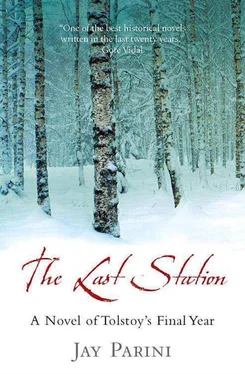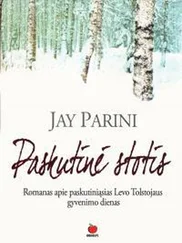I thought that finally happiness had found me. Then Lyovochka wrote me one of his famous, stupid letters:
I find it infinitely sad and humiliating that a worthless and unappealing stranger should now be ruling our lives and poisoning our final years together; sad and humiliating to be forced to ask when he is leaving, where he’s going, when he will rehearse his stupid music, and what music he will play. It’s terrible, terrible, base and humili ating! And that it should happen at the end of our lives, which until now have been honest and clean – also at a time when we appear to have been drawing closer and closer, in spite of the many things that divide us…
How he went on! My Lyovochka likes nothing better than to thrash himself, to don the hair shirt and mortify his flesh. But why does he always have to thrash me, too? The subject of Tanayev drove him crazy. Of course, it flattered me that he should, at his age, have become jealous of my attentions. Before Sergey Ivanovich came along, he paid no mind to who sat with me on the sofa or wrote me little notes or invited me to tea. I would never have expected this turn in Lyovochka, since jealousy is the province of those with nothing else to do. But Sergey Ivanovich annoys him in the most irrational way!
Thinking it over, I believe it has something to do with Tanayev’s womanliness. Sergey Ivanovich is not the brute, masculine type that Lyovochka, in spite of himself, admires. He would never be caught dead riding in the woods on horseback or, in his youth, shooting animals. He likes to take bubble baths, to perfume himself, to wear bright colors – the sort of behavior that irritates Lyovochka beyond description.
Ah, the letters that passed between us. Lyovochka hated my trips to Moscow and was sure that I went to our house on Dolgo-Khamovnicheski Street for the sole purpose of meeting Tanayev. For once, he was right. I was meeting him, and I loved those meetings! But nothing shameful passed between us. It was innocent, pure and simple!
One doesn’t have to become a man’s lover to love him. I know that. But Sergey Ivanovich is simply not the sort of man who takes lovers anyway, not in the usual sense. He does not require the baser satisfactions – something the old goat could never comprehend.
Once, only once, he kissed me.
But that is history. We do not see each other now. We do not communicate. Lyovochka put an end to it, with a letter sent from his brother’s farm in Pirogovo: ‘It disgusts me to see you once again taking up with Tanayev in this manner. Frankly, I cannot continue to live with you under these circumstances…. If you cannot put an end to this, let us part company.’
Let us part company! After a rueful laugh, I wept. But the letter continued, sketching out four ‘solutions’ to our ‘problem’:
1. The best thing is for you to break off all relations with Tanayev at once, never minding what be might think. This will release us instantaneously from the nightmare that has been tormenting us both for over a year. No meetings, no correspondence, no exchange of portraits, no little musbroom gatberings in the woods.
2. I could go abroad, having separated from you entirely. Each of us could then lead his or her own life.
3. We could both go abroad, thus facilitating your break with Tanayev. We would remain abroad for as long as it took for you to break this infatuation.
4. The most terrible solution is the fourth, and it causes me to shudder. We could attempt to convince ourselves that the problem will right itself and do nothing.
Why did he torment himself with such hairsplitting madness? I did not know what to answer him, finding the entire subject baseless and foolish.
For much of autumn I had been living in Moscow, studying the piano with Tanayev, attending concerts almost every night at the Conservatory. Toward winter, Lyovochka appeared on Dolgo-Khamovnicheski Street, his eyes red like open wounds, his hair and white beard flying apart. It struck me forcibly that he was deranged.
He said not a thing about Tanayev all day, but I knew exactly what lay behind his stalking about the house like a wild boar. Lyovochka is nothing if not obvious. As we lay in bed that night, surrounded by what he so charmingly refers to as our ‘disgraceful luxury,’ I spoke openly about the problem. I had considered it carefully, deciding it was not worth continuing my relations with Tanayev as presently constituted.
‘Lyovochka,’ I said, sitting up in bed. ‘I will end my lessons with Sergey Ivanovich. No more lessons. No more long stays in Moscow on my own, either, if that upsets you so much. But I do ask one favor: that he may visit me once a month – or every other month, perhaps. I want him to feel free to come, occasionally, to sit beside me at the piano for an afternoon, much as any friend would do.’
Lyovochka lifted himself to a sitting position, staring ahead like an embalmed corpse. He was shuddering, as if chilled to the marrow. I grew afraid.
‘Is that too much to ask?’ I said. ‘A simple friendship with Sergey Ivanovich?’
‘What you just said proves that your relationship with Tanayev has already exceeded the limits of friendship,’ he responded, his voice high and quavering. ‘What other person’s monthly visit would bring you so much joy? If this is the case, why not see him weekly, even daily! You could rejoice every moment of your life!’
The conversation went from worse to impossible. He called me a ‘concert hag’ and flew into such a rage I thought he would asphyxiate himself with anguish! But I got back at him. Perhaps ‘got even’ is a better way to put it. I would not be conscripted, co-opted, hemmed, and bordered. I would wage a war of the people, a war on behalf of my deepest needs. In the end, I would win.
‘Go ahead!’ I said, ‘Murder me! Slice my throat from ear to ear!’ I thrust myself backward across the quilt, exposing the tender region beneath my chin.
He fulminated, silently, for several minutes, then resorted to his chief weapon: his sex. Like a young lion, he fell on top of me, kissing my throat, then my forehead, rubbing my breasts with his coarse red hands. I realized there was no point, not any longer. I could not fight Leo Tolstoy – not now. But I quietly resolved to continue my resistance.
For the sake of politeness, I invited Sergey Ivanovich to Yasnaya Polyana for a brief visit, some months later. He came. And Lyovochka remained civil. But everyone knew it was over.
My one hope now, a faint but unmistakable beam of light tunneling down through the clouds of my life here, is Bulgakov. I realized shortly after he stepped through our door that this was a young man with sense; he is not, like the dread Gusev, another of Chertkov’s mindless minions. Why do they kowtow to him like an Oriental prince? That tub-faced, sallow, spiteful man! If I could pluck his heart out with my bare fingers, I would do it. I would hang by my neck till dead for the pleasure of killing him. At least he is banished from Tula. The governor has good sense: Chertkov is a dangerous revolutionary. But he is also a fool. Bulgakov, whom he surely does not know except superficially, will never enforce his nasty little schemes. Chertkov has made a lovely little mistake here.
Yesterday, I waited outside the room where Bulgakov works.
‘Excuse me, Valentin Fedorovich,’ I said, when he stepped through the door. ‘Would you come to my sewing room? We could take a glass of tea and talk.’
‘Thank you, Countess,’ he said. ‘I would be honored.’
‘Please, my friend!’ I put a hand on his arm. ‘Call me Sofya Andreyevna. We do not stand on formality around here, as you may have observed.’
His arm was like iron, straight and strong. Though he is terribly thin, he did not seem weak. His eyes have a brightness and permanence about them, and when he speaks, he looks directly at you. None of the other Tolstoyans do this. They feel guilty around me – the weasels! But not Bulgakov. He is sweet and kindly by nature. He is intelligent, yes, but thoughtful and gentle. He does not feel superior because he has read Plato or some obscure German. Nor does he believe, like Chertkov and Sergeyenko, that eating no meat absolves him of all other sins!
Читать дальше












